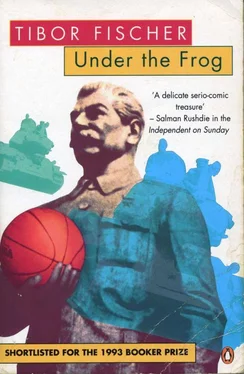Tibor Fischer - Under the Frog
Здесь есть возможность читать онлайн «Tibor Fischer - Under the Frog» весь текст электронной книги совершенно бесплатно (целиком полную версию без сокращений). В некоторых случаях можно слушать аудио, скачать через торрент в формате fb2 и присутствует краткое содержание. Жанр: Современная проза, на английском языке. Описание произведения, (предисловие) а так же отзывы посетителей доступны на портале библиотеки ЛибКат.
- Название:Under the Frog
- Автор:
- Жанр:
- Год:неизвестен
- ISBN:нет данных
- Рейтинг книги:3 / 5. Голосов: 1
-
Избранное:Добавить в избранное
- Отзывы:
-
Ваша оценка:
- 60
- 1
- 2
- 3
- 4
- 5
Under the Frog: краткое содержание, описание и аннотация
Предлагаем к чтению аннотацию, описание, краткое содержание или предисловие (зависит от того, что написал сам автор книги «Under the Frog»). Если вы не нашли необходимую информацию о книге — напишите в комментариях, мы постараемся отыскать её.
Shortlisted for Booker Prize 1993
Set in post-war Hungary between 1944 and 1956, this ferociously funny and bitterly sad story follows the fortunes of two young men in the pursuit of sex and the avoidance of work and army service. They survive the chaos of communism by becoming part of a travelling basketball team.
Under the Frog — читать онлайн бесплатно полную книгу (весь текст) целиком
Ниже представлен текст книги, разбитый по страницам. Система сохранения места последней прочитанной страницы, позволяет с удобством читать онлайн бесплатно книгу «Under the Frog», без необходимости каждый раз заново искать на чём Вы остановились. Поставьте закладку, и сможете в любой момент перейти на страницу, на которой закончили чтение.
Интервал:
Закладка:
The curious thing about Elek was that the less active he became, the less he slept, thus ensuring his availability to give Gyuri the benefit of his thoughts as Gyuri got ready to go to work. ‘You see, István, for example, will always have the disadvantages of everything that money could buy.’ István, in practice, was bearing up beneath that burden rather well. He had returned at the end of ’45, with a dozen chums who disembarked from the prisoner of war camp in Denmark where they had been guarding themselves, carrying two thousand cigarettes and fluent in fifteen languages. Before things grimmed up, István had managed to get a job in the Ministry of Agriculture where he had got to know everything there was to know about sugar. Because he was unobtrusively junior and because they had to retain some people at the Ministry who knew something about agriculture, he had been magnanimously tolerated.
István had laughed about it all, as he did about everything. Always of a jovial disposition, he had returned from his years on the Russian front, with one important souvenir: the inability to get worked up about things that weren’t three years on the Russian front. You could tell István things like, you had gone to a restaurant and contracted hepatitis, you were going to be conscripted into the army, you had just been jilted by the girl who was more important to you at that moment than life and that you wanted to fold up and die, and István would just chuckle or if you looked really miserable, guffaw loudly.
István had reappeared in Budapest the day after they had been burgled.There hadn’t been much left to steal after the Red Army had manoeuvred back and forth across the flat a couple of times and furniture had been traded for food. István had walked in as if he had just returned from the corner-shop to find Gyuri dazed by the inexhaustibility of their misfortune. István immediately went out again, and the next morning all the missing items were piled up outside the front door with a note apologising that the dust pan left wasn’t the original but hoping the replacement would live up to expectations and wishing the family good health. The only other survivor from István’s artillery unit it turned out, was one of the master burglars of Budapest who had been greatly peeved to hear that his commanding officer’s family should have suffered such an indignity. There was only one question that István asked when you started to reconstruct some tribulation: ‘What did you do about it?’
It was what you did about it, not the blubbering, that interested István. István came back for the peace, got married, got a job, got a flat. His most annoying habit was his way of making life look easy. His application and down-to-earthness were such that it was hard to believe he was related in any way to Elek. Where had he got it from? Why didn’t he have any? Gyuri pondered. István was capable of sorting out anything, of making the best of the worst, which was why Gyuri couldn’t understand what had made him come back to Hungary and what had made him stay there. István seemed capable of anything, except perhaps getting Elek a proper job.
‘Have you just given up then?’ Gyuri had demanded of Elek.
‘Given up? Given up what? Tennis? Smoking? Horse-racing? My studies in Sanskrit? I’m an old fart, you know,’ Elek remarked checking the length of each bristle of his moustache in a pocket mirror. ‘You can’t expect too much. You, the healthy, vigorous son with his whole life ahead of him should be thinking of supporting his valetudinarian father.’
‘Doesn’t it bother you?’
‘Does it bother me? Yes. No. You may be surprised to hear that when I was growing up it wasn’t the summit of my ambitions to end up in an armchair wearing a grey pullover with holes in it. I confess I was thinking more in terms of excessive luxury. But I do enjoy disappointing people by not being suicidally miserable.’
Elek should have considered a post as a Party secretary, Gyuri reflected, with his gift of the gab and his inclination for doing nothing. After the war they would have taken anyone. Not now. Now, they were hanging the Communists they already had.
Sulyok, the foreman, was doing one of his readings to Gyuri’s workmates when Gyuri finally arrived to do his day’s work. This discovery made Gyuri very pleased that he had arrived late. The main reason that Gyuri had such a surfeit of nonchalance about tardiness was that he and Pataki had been given jobs at the factory by Gombás himself, the deputy director of the works, and people knew this. An Olympic medallist, a weight-lifter whose efforts had been rewarded with a tasty sinecure at the Ganz works, Gombás was keen to build up the works’ basketball team, to propel them into the first division. Thus Pataki and Gyuri, as Pataki’s personal ball-passer, were invited to join the team and to spend a little time at the works. Gyuri got on well with Gombás and liked him, not just because he had provided Gyuri with the job and evasion of the army but also because Gombás was an affable type and Gyuri rather admired his open-handed perversion. What Gyuri rather admired was that, while other men would have been vein-openingly ashamed of their peccadillo, Gombás was charmingly frank and unrepentant about his penchant for girls teetering on pubescence. His office was spacious, sequestered and complete with shower. There, girls hand-picked by Gombás on his travels in the provinces and brought to Budapest for ‘intensive training’ received his ‘personal tuition’. Gyuri was always expecting to see some enraged parent or the police march into Gombás’s office, but so far it seemed the arrangement had upset no one and there was always the possibility, as Pataki had pointed out, that if fellatio ever became an Olympic event, Hungary would clean up.
Every now and then, Sulyok would feel obliged to give a reading from the Party newspaper which of course had the same content as the other papers but there were some fascinating variations in the punctuation. Considering how boring ‘Free People’ was on the page, and how people would only think about reading it in the most desperate circumstances of tedium, it was hard to see why it was thought that having Sulyok crawl through a passage, adding new layers of dullness, would render it more memorable.
The extract that morning was from ‘Party Worker’, a fortnightly journal that was even more tightly controlled by boredom than ‘Free People’. It was as if they specially selected the dreariest bits from ‘Free People’, excised any microscopically colourful vestiges, and then published the whole thing as ‘Party Worker’.
Sulyok was just finishing an article by Revai on the executions of Rajk and his band. Rajk had been convicted of working on behalf of not only the British and American intelligence services (in addition to a distinguished career as a police informer when the Communist Party had been proscribed) but also doing a bit of moonlighting for Marshall Tito and his filthy Yugoslav deviationists. Why wasn’t he working for Walt Disney as well? Gyuri was tempted to ask. Probably because being Minister of the Interior had taken up too much of his time, Gyuri answered himself. It had been rather amusing to see Rajk hang, there was a shapely irony in the Minister of the Interior, the man who had so lovingly built up the Communist state, who had nourished the secret police, being the first to jig on air when they ran short of non-Communists.
Gyuri had no idea what the true facts of the hangings were but there could be no doubt that what was in the papers was a load of absolute bollocks, since it came from the people who specialised in absolute bollocks, the Hungarian Working People’s Party.
‘But with the disposal of the conspirators, our considerable victory will augment our strength and decisiveness, in order to finish the tasks waiting ahead for us,’ Revai’s article concluded. The only joke Gyuri could remember about Rajk was that he had been appointed to the government because they needed someone at hand in case documents needed to be signed on a Saturday. Rákosi, Gero, Farkas and Revai, the quartet imported from Moscow to run Hungary were all Jews, or at least were considered to be Jews, since as far as Gyuri was aware no one had caught them at the synagogue. The Moscow quartet was giving the chosen people the sort of publicity they hadn’t had since they voted to nail Christ to some bits of wood.
Читать дальшеИнтервал:
Закладка:
Похожие книги на «Under the Frog»
Представляем Вашему вниманию похожие книги на «Under the Frog» списком для выбора. Мы отобрали схожую по названию и смыслу литературу в надежде предоставить читателям больше вариантов отыскать новые, интересные, ещё непрочитанные произведения.
Обсуждение, отзывы о книге «Under the Frog» и просто собственные мнения читателей. Оставьте ваши комментарии, напишите, что Вы думаете о произведении, его смысле или главных героях. Укажите что конкретно понравилось, а что нет, и почему Вы так считаете.












